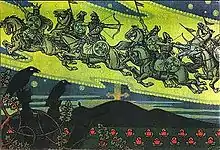Székely himnusz
Székely himnusz (Székely Anthem) is a 1921 poem adopted by Szekler National Council as the anthem of the Székely Land on 5 September 2009.[1] The lyrics were written by György Csanády[2] and its music was composed by Kálmán Mihalik.[3]
| English: Székely Anthem | |
|---|---|
 Prince Csaba on the stars' path | |
anthem of | |
| Lyrics | György Csanády, 1921 |
| Music | Kálmán Mihalik, 1921 |
| Adopted | 5 September 2009 |
| Audio sample | |
Székely Himnusz (vocal)
| |
Original lyrics
Hungarian
Ki tudja merre, merre visz a végzet
Göröngyös úton, sötét éjjelen.
Vezesd még egyszer győzelemre néped,
Csaba királyfi csillagösvényen.
Maroknyi székely porlik, mint a szikla
Népek harcának zajló tengerén.
Fejünk az ár, jaj, százszor elborítja,
Ne hagyd elveszni Erdélyt, Istenünk!
Ameddig élünk Magyar ajkú népek
Megtörni lelkünk nem lehet soha.
Szülessünk bárhol, világ bármely pontján,
Legyen a sorsunk jó vagy mostoha.
Maroknyi székely porlik, mint a szikla
Népek harcának zajló tengerén.
Fejünk az ár, jaj, százszor elborítja,
Ne hagyd elveszni Erdélyt, Istenünk!
Literal translation
Who knows where destiny takes us
On a rough road on a dark night.
Help your nation to victory once more,
Prince Csaba, on the stars' path.
Handful of Székely being crushed like the cliffs
On the sea storming from the battle of nations.
Our heads are a thousand times covered by the tide,
Don't let Transylvania be lost, our God!
Common variant and additional verses
| Hungarian | English translation | English metrical translation (H.W. Morrison) |
|---|---|---|
|
Ki tudja merre, merre visz a végzet Maroknyi székely porlik, mint a szikla Ameddig élünk magyar ajkú népek Maroknyi székely... Már másfélezer év óta Csaba népe Maroknyi székely... Keserves múltunk, évezredes balsors Maroknyi székely... Hős szabadságát elveszti Segesvár Maroknyi székely... Édes Szűzanyánk,könyörögve kérünk, Refr... Maroknyi székely porlik mint a szikla, |
Who knows where destiny takes us Handfuls of Székely turned to dust like rocks As long as we live, Hungarian speaking peoples, Handfuls of Székely... People of Csaba since one and a half millennia Handful of Székely... Our grievous past, misfortune of a millennia Handful of Székely... Segesvár (Sighișoara) lost its heroic freedom Handful of Székely... Oh Holy Virgin, we are begging you Refr... Handfuls of Székely being crushed like rocks |
Who knoweth where, O where our destiny shall be? Pounded and crushed upon the rocks, the Székely few Whilst life remains with us, we of Hungarian birth Pounded and crushed... People of Csaba, thrice five hundred years through Pounded and crushed... Our grievous past, our thousand years of harsh pain Pounded and crushed... O Segesvár, thy freedom cast asunder Pounded and crushed... O holy Virgin, hear as we implore thee Pounded and crushed... Pounded and crushed upon the rocks, the Székely few |
Sheet music
See also
References
- "A Székelyföldi Önkormányzati Nagygyűlés határozatai" [Decrees of the Szekler Grand Assembly] (in Hungarian). Székely Nemzeti Tanács (Szekler National Council). 5 September 2009. Archived from the original on 21 June 2012. Retrieved 24 June 2012.
The office holders of the elected Szekler National Council, as the founders and participants of the Szekler Grand Assembly declares the adoption of the Székely Himnusz, of which music was composed by Kálmán Mihalik and of which lyrics was written by György Csanády, as the anthem of Székely Land. ("Székelyföld választott önkormányzati tisztségviselői, mint a Székelyföldi Önkormányzati Nagygyűlés létrehozói és résztvevői [...] elhatározzák [hogy] a Székely Himnuszt, amelynek zenéjét Mihalik Kálmán szerezte, szövegét Csanády György írta, Székelyföld himnuszának nyilvánítják)
- Péter, László, ed. (1994). Új Magyar Irodalmi Lexikon. 1, A–Gy. Akadémiai Kiadó. p. 343. ISBN 9630568055.
- Kríza, Ildikó. "A Székely himnusz születésének háttere" (in Hungarian). Unitarian Church in Hungary. Retrieved 24 June 2012.
According to György Csanády's credible records the poem written in 1921 was called in the májusi nagyáldozat yet as kantáté and its music was composed by Kálmán Mihalik for girls' choir."("Csanády György hiteles tájékoztatása szerint az 1921-ben keletkezett verset a májusi nagyáldozatban még kantáténak nevezte és lány karra komponálta a zenét Mihalik Kálmán.)